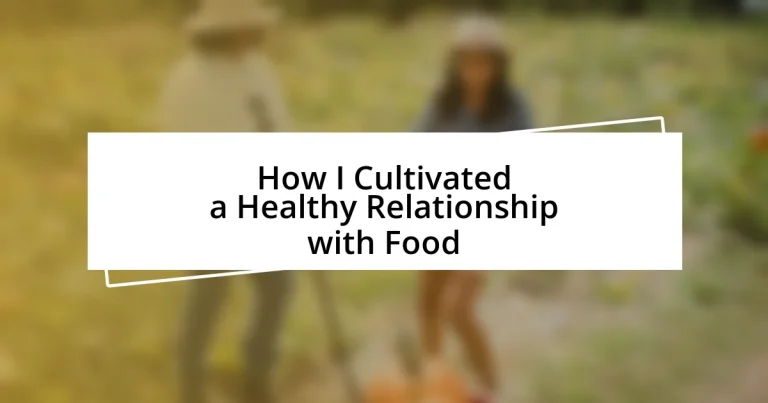Key takeaways:
- Reflect on emotional triggers and eating habits to develop a healthier relationship with food, recognizing that eating isn’t always related to hunger.
- Set realistic, manageable eating goals and celebrate small successes to build positive habits without feeling overwhelmed.
- Practice mindful eating by creating a pleasant environment, checking in with hunger cues, and allowing indulgence without guilt to enhance enjoyment and satisfaction with food.
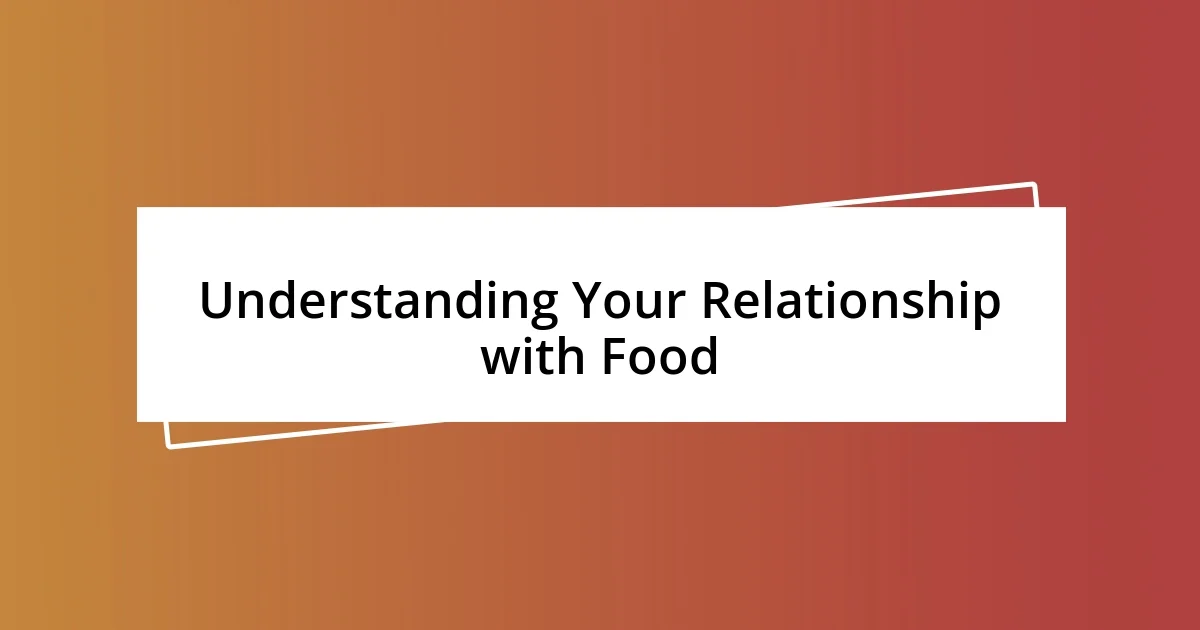
Understanding Your Relationship with Food
Understanding your relationship with food involves reflecting on your emotions and habits surrounding eating. For instance, I used to notice that I often reached for snacks when I felt stressed or anxious. Have you ever asked yourself if you eat out of boredom or to celebrate? Recognizing these patterns was a game changer for me.
I remember a time when I indulged in a large piece of cake on my birthday, fully aware I was more celebrating others than myself. That moment taught me that food is about connection, but it shouldn’t be tied to guilt or obligation. How do you see your food choices influenced by social settings? This exploration helps uncover the deeper emotions that drive our eating habits.
Additionally, I’ve realized that labeling foods as “good” or “bad” creates unnecessary tension. Instead, I now view food as a spectrum of choices that nourish my body and soul. When was the last time you savored a meal without judgment? Finding that balance has allowed me to enjoy food without the weight of guilt, turning eating into a celebration rather than a chore.
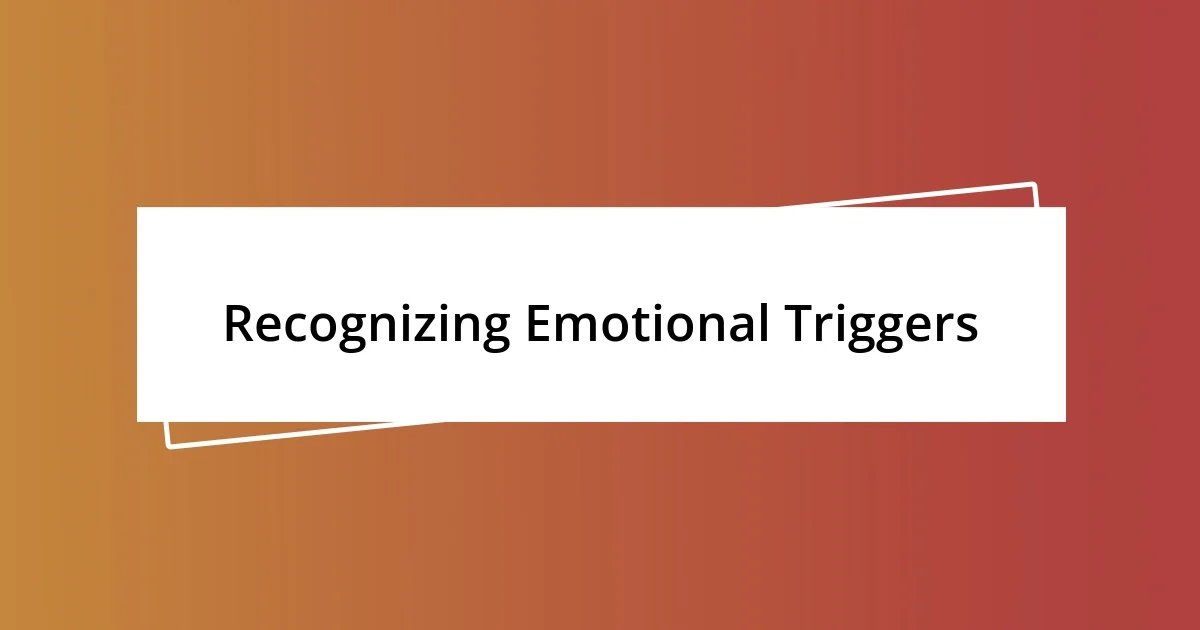
Recognizing Emotional Triggers
Recognizing emotional triggers was a revelation for me. I found that certain feelings often led me to seek comfort in food. For instance, after a tough day at work, I would instinctively grab a tub of ice cream. It took some time to connect those dots. Now, I pause and ask myself why I’m reaching for food. It’s not always about hunger; sometimes, it’s about soothing an emotion or filling a void.
To help identify your emotional triggers, consider these guiding questions:
- What situations lead me to eat when I’m not hungry?
- Do I use food as a reward for accomplishing tasks?
- How do my relationships with others influence my cravings?
- Are there specific emotions, like sadness or boredom, that escalate my desire to snack?
These reflections can guide you toward understanding your eating habits more clearly, helping you foster a healthier relationship with food.
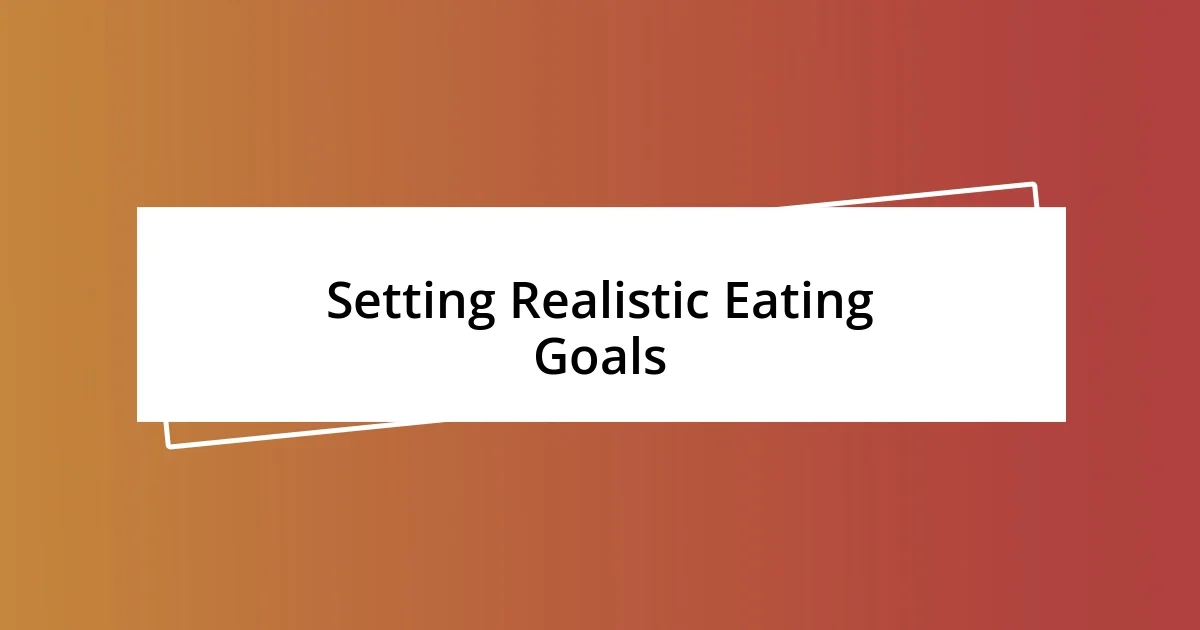
Setting Realistic Eating Goals
When it comes to setting realistic eating goals, the first step is to understand what works for you personally. I remember trying to overhaul my diet entirely overnight, only to feel overwhelmed and discouraged. A more effective approach was to start small. For instance, rather than eliminating desserts altogether, I focused on enjoying smaller portions or choosing healthier options a few times a week. It’s about progress, not perfection—what small change can you start with today?
Another crucial element is finding goals that fit seamlessly into your lifestyle. I once set a goal to cook at home five nights a week, a lofty aim given my busy schedule. The reality hit hard when takeout became my best friend instead. So, I shifted to setting more manageable targets, like trying one new recipe each week. This not only made me more excited about cooking but also helped me develop a beautiful habit without feeling pressured.
Lastly, remember to celebrate your successes, no matter how minor. I learned that setting a goal to incorporate one new vegetable each week was both achievable and fun. Each time I did it, I felt a sense of accomplishment, motivating me to keep going. You might find that what starts as a small goal evolves into a new passion for healthy eating. What little success can you acknowledge today?
| Eating Goal Approach | My Personal Experience |
|---|---|
| Small Changes | Started with smaller portions of dessert |
| Realistic Targets | Shifted to trying one new recipe weekly |
| Celebrating Achievements | Incorporated new vegetables and celebrated each success |
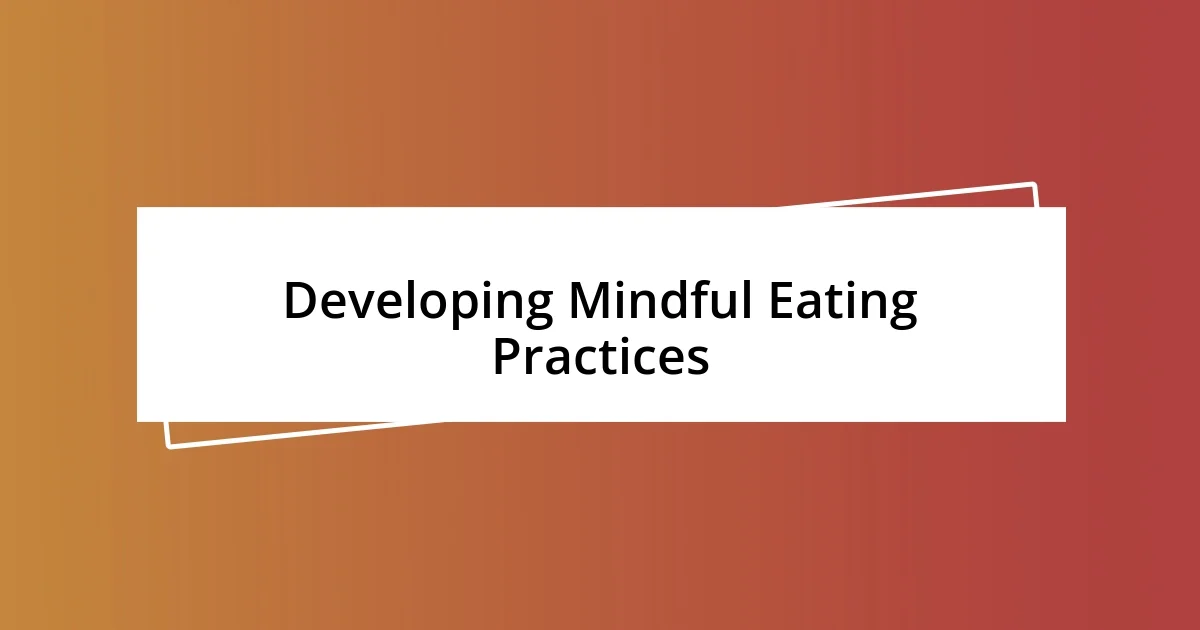
Developing Mindful Eating Practices
Mindful eating transformed my approach to food in ways I never expected. I began by slowing down during meals, taking time to savor each bite. I used to rush through dinner like it was a task on my to-do list. Now, I engage my senses—feeling the texture of the food, enjoying its flavors, and soaking in the aroma. It’s incredible how just one minute of mindfulness can shift your entire eating experience. Have you ever noticed the difference in how food tastes when you truly pay attention to it?
Finding the right environment was also key for me. I created a dedicated mealtime space that felt inviting, free of distractions like screens or work. When I started this practice, I realized how much I missed the simple pleasure of enjoying food in peace. Lighting a candle or playing soft music made a world of difference in turning a routine meal into a moment of joy. How does your eating environment impact your experience?
Moreover, I’ve learned to check in with my body while eating. Before, I often pressed on, even when feeling full. I implemented a simple practice: after every few bites, I pause to assess my hunger. Am I still enjoying this meal? Do I need to eat more, or can I save some for later? This small act of tuning into my body has been liberating, allowing me to cultivate a more intuitive relationship with food. What if you tried this approach too?
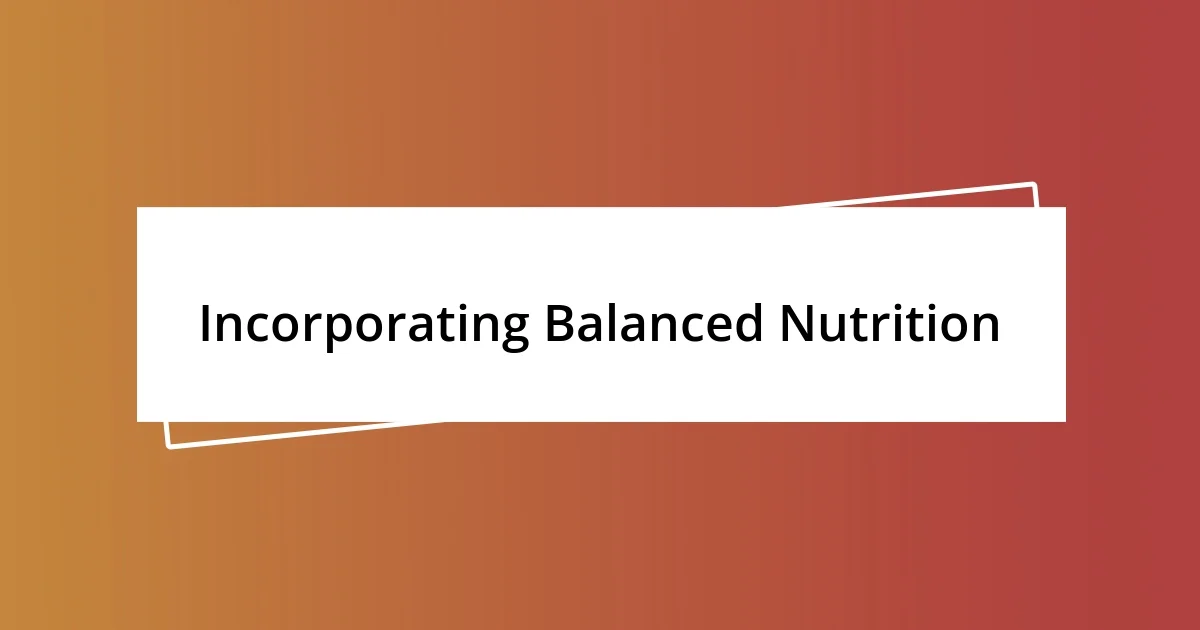
Incorporating Balanced Nutrition
Incorporating balanced nutrition into my daily routine was a game-changer for me. Initially, I felt overwhelmed by the myriad of diets and food fads, but I realized that focusing on whole, nutrient-dense foods made the most sense. For example, I began swapping out processed snacks for fresh fruits and nuts, which not only nourished my body but also kept my energy levels steady throughout the day. Remember, it doesn’t have to be perfect; it just has to work for you.
One practical strategy I adopted was planning my meals ahead of time. This habit was born from all those evenings I found myself staring blankly into the fridge, unsure of what to eat. I started dedicating a little time each Sunday to outline my meals for the week. This simple act brought a sense of control and variety to my week, plus it saved me from the dreaded last-minute takeout. How do you think you could benefit from a little meal planning?
In addition, I discovered the joy of cooking from scratch, which allowed me to incorporate a wide range of ingredients. I still remember the first time I tried making a colorful stir-fry packed with vegetables—each crunch felt like a wonderful celebration of flavors. It was empowering to know exactly what was going into my meal, and it transformed my perception of food as merely fuel into something I could genuinely enjoy. Could you unleash your inner chef by experimenting with new recipes in your kitchen?
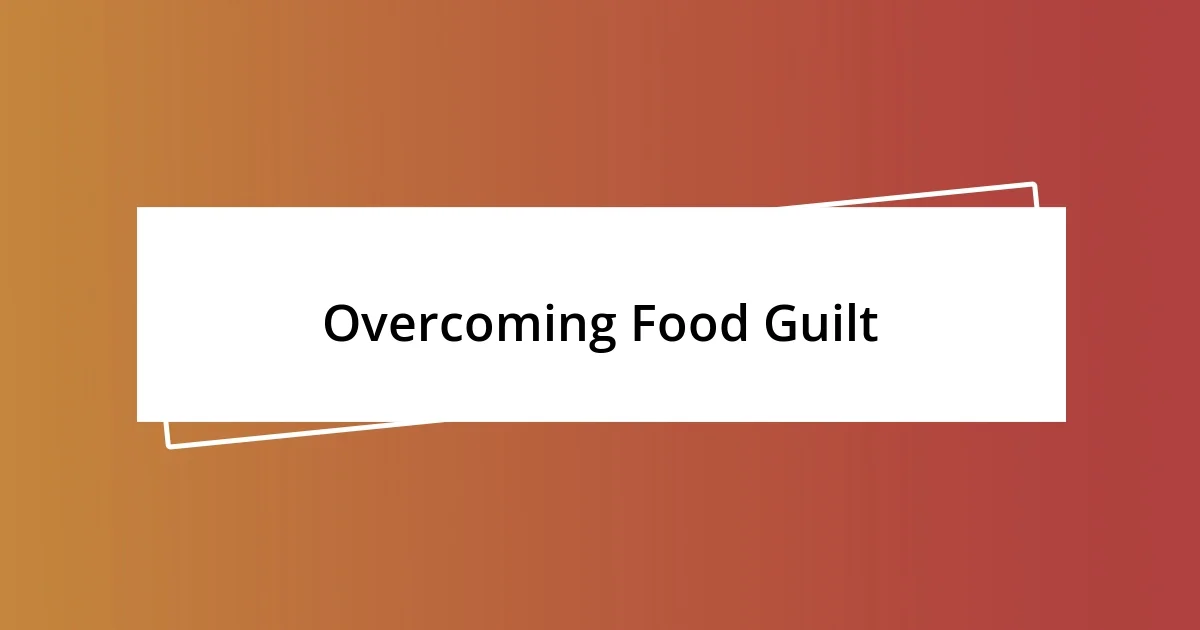
Overcoming Food Guilt
Overcoming food guilt has been one of the most liberating experiences in my journey with food. In the past, I often found myself haunted by thoughts of “should I really eat this?” whenever I treated myself. It took time, but I learned that indulging isn’t a crime; it’s a way to appreciate the pleasures of life. I remember a Sunday afternoon when I decided to bake a rich chocolate cake for the first time in years. Instead of feeling guilty as I licked the batter off the spoon, I savored every mouthful, reminding myself that enjoyment is a fundamental part of nourishing my soul.
Understanding that food is not just about nutrition but also about emotional well-being was a turning point for me. I’ve come to realize that the enjoyment I derive from certain foods—like the doughy texture of a fresh bagel or the buttery goodness of popcorn during movie nights—adds richness to my life. I ask myself: why should I feel guilty about creating joyful memories around food? By allowing myself to indulge mindfully, I’ve discovered that guilt often stems from a restrictive mindset.
I also found it helpful to reshape my narrative around food. Instead of labeling foods as “good” or “bad,” I started to think of them as “fuel” or “fun.” This shift was eye-opening. For example, I no longer see sugar-laden desserts as an enemy; instead, I view them as delightful treats for special occasions. Have you ever stopped to truly think about how you classify your foods? This simple change has taught me to appreciate a wide variety of foods without shame, ultimately fostering a healthier relationship with what I eat.
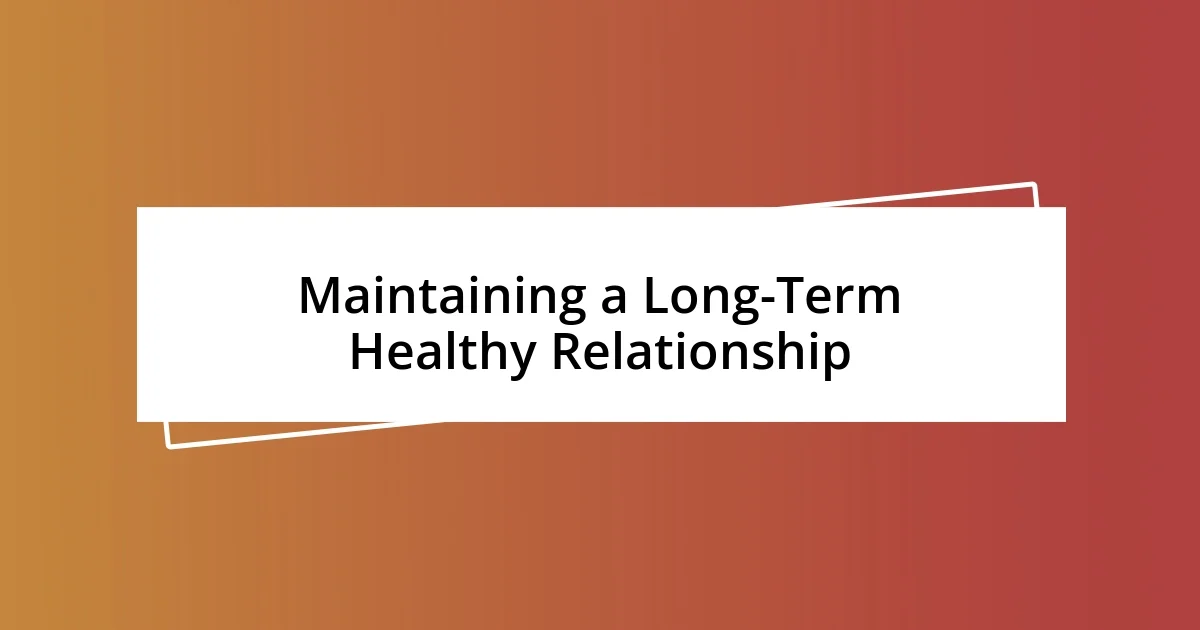
Maintaining a Long-Term Healthy Relationship
Maintaining a long-term healthy relationship with food involves regular check-ins with myself about what I truly need, both physically and emotionally. I remember a day when I felt particularly stressed and turned to my go-to comfort food, which typically would have led to overindulgence. This time, however, I paused to evaluate my feelings and instead chose a nourishing meal that filled me with energy rather than a temporary high. Isn’t it interesting how taking a moment to reflect can reshape our choices?
Another key aspect I’ve embraced is flexibility. Life is unpredictable, and rigid eating habits can lead to frustration. I discovered that when I occasionally enjoy takeout or skip a meal prep session, it doesn’t derail my entire journey. One evening, after a long day, I decided to order pizza instead of forcing myself to cook. Rather than feeling guilty, I savored that meal, reminding myself it’s just a part of life’s ebb and flow. How do you allow yourself to be flexible without spiraling into old habits?
Lastly, I think it’s essential to surround myself with support. Sharing experiences with friends or joining a community focused on health can make a world of difference. I recall joining a local cooking class where everyone brought their stories and knowledge to the table. Those connections not only deepened my appreciation for food but also helped me feel understood when struggles arose. Have you thought about who you can share your journey with? Fostering a network can help reinforce your commitment to maintaining this healthy relationship.











